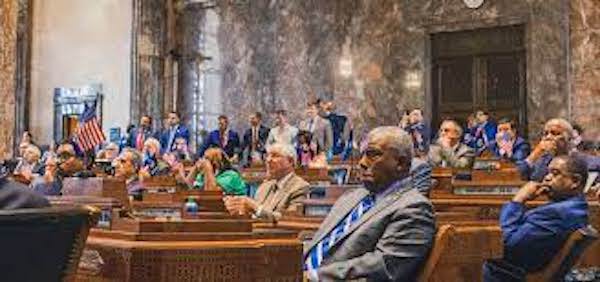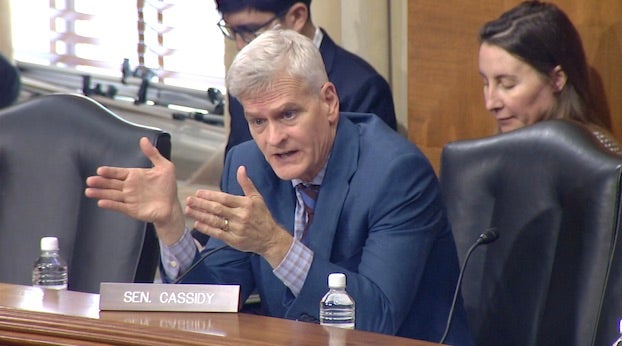Jim Beam column:Override of vetoes likely
Published 6:56 am Thursday, June 23, 2022

- The Republican Louisiana Legislature is expected to be in a veto session in July after Democratic Gov. John Bel Edwards vetoed 23 bills from their recent regular session.senate.la.gov
The 17 bills from the Louisiana Legislature’s regular session that Gov. John Bel Edwards recently vetoed pretty much guarantees lawmakers will hold a veto session in mid-July. He vetoed six other bills earlier.
Legislators have already overridden a congressional redistricting bill that Edwards vetoed from a special session with help from three independents and one Democrat.
Veto overrides require a two-thirds vote (70 in the House and 26 in the Senate). The Senate has 27 Republicans. There are 69 GOP members in the House and a second independent is thinking about becoming a Republican.
Trending
Republicans feel strongly about three issues that resulted in vetoes — school choice, tougher criminal sentences, and opposition to vaccination requirements.
Both of the school choice bills would allow students to use annual state funds to attend private schools or to pursue other education options.
Edwards vetoed Senate Bill 203 by Sen. Sharon Hewitt, R-Slidell, that created the Reading Education Savings Account Program. It would aid second and third grade students reading below grade level.
House Bill 194 by Rep. Rhonda Butler, R-Ville Platte, sets up Education Savings Accounts for students with exceptionalities who are not enrolled in public schools. Those exceptionalities include mental disability, hearing loss, multiple disabilities, deaf-blindness, speech or language impairment, specific learning disability, traumatic brain injury, autism, and developmental delay. Students who are solely deemed to be gifted and talented wouldn’t be eligible.
Edwards said the bills divert money from public school funds, don’t set up parental savings accounts to help pay for school choice, and allow children of wealthy parents to attend private schools subsidized by taxpayer dollars.
The Louisiana Association of Business and Industry (LABI) and The Pelican Institute for Public Policy support school choice. Stephen Waguespack, LABI president, said the veto of the exceptional students measure is disgraceful.
Trending
Daniel Erspamer, CEO of The Pelican Institute, said the bills “would help get our kids into schools that best fit their needs so they can have bright futures.”
Hewitt’s bill passed the Senate 24-13 and the House 70-27 on its first vote in each chamber. The reworked bill in conference that settled differences received a 24-7 vote in the Senate and 97-0 vote in the House.
Butler’s bill passed the House 90-2 and the Senate 31-0 on its first try. The House agreed to the Senate’s changes and gave the bill 99-0 approval on its last vote.
The votes on those bills indicate getting a legislative override of Edwards’ vetoes shouldn’t be too difficult
Edwards said the tougher criminal justice penalties in other bills would backtrack on 2017 reforms that pushed to change Louisiana’s status as the state with the highest incarceration rate in the country. He talked about a bill that places a “scarlet letter” on someone for one drug offense and said the focus should be on treatment.
Another crime bill, he said, would unfairly treat a person convicted of a crime of negligence the same as a person convicted of an intentional crime.
Rep. Larry Bagley, R-Stonewall, and chairman of the House Health and Welfare Committee, is sponsor of HB 54 that was also vetoed. It would prohibit any government entity or public educational institution from banning entry onto their premises based on their COVID-19 vaccination status.
Votes on Bagley’s bill indicate a veto override may be difficult. It passed the House 59-26 and the Senate 24-9 on its first try. The conference committee report got a 58-32 House vote and a 27-5 Senate vote.
Edwards in his veto message said, “The bill is unnecessary and perpetuates the false narrative that the residents of Louisiana face vaccine mandates to access government services or attend schools. This is not the case. The bill seeks to undermine public confidence in vaccines, which are safe, effective, and essential to public health…”
Rep. Les Farnum, R-Sulphur, sponsored HB 35 requiring a supplemental annual canvass of registered voters. Edwards vetoed it for the second time, saying he vetoed the 2021 bill because it was “simply unnecessary” and would make it easier to remove eligible voters from the rolls. He said he vetoed it again for the same reason.
Farnum’s bill passed the House 69-28 and the Senate 29-0, giving it an opportunity for a successful override of the governor’s veto.
A veto override session 40 days after adjournment is automatic unless a majority of either the House or Senate declares in writing the veto session is unnecessary. The only thing that might keep a session from happening is the fact lawmakers have spent an awful lot of time this year in sessions at the state Capitol.





